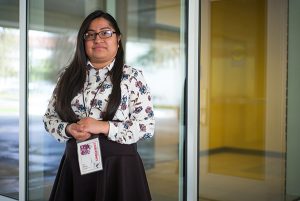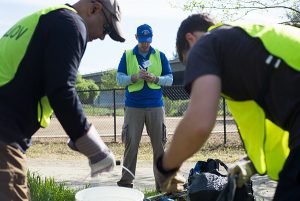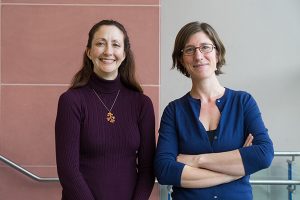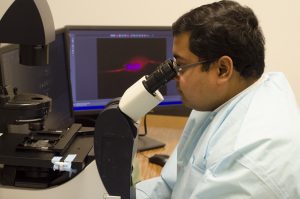
Photo: James Tensuan
Bianca Jaimes posed for a photo on campus with her Cinequest Film and VR Festival pass. She was one of eight SJSU students to intern during the spring festival. (Photo: James Tensuan, ’15 Journalism)
By David Goll
By the time Bianca Jaimes — a San Jose State University senior majoring in Radio, Television and Film — finished her internship with the 2017 Cinequest Film and VR Festival last month, the experience had sharpened her focus on her future in the industry.
Not only did she learn firsthand how film festivals work, including the crucial art of networking to make industry connections, but also how important the planning and pre-production part of a film project is for its ultimate success.
“The internship definitely helped me and gave me consideration, choices and options to consider for my future,” she said. “It did give me more insight on the process of getting my own productions out there.”
At this year’s festival, eight SJSU students participated in the internship program for the annual event that screened more than 500 films from Feb. 28 to March 12 at venues scattered throughout downtown San Jose, as well as San Jose’s Santana Row and Redwood City. Alison McKee, a professor in the Department of Television, Radio, Film and Theatre who alternates directing RTVF internships with Professor Kimb Massey, said one-quarter of the department’s 32 spring semester internships among juniors and seniors are with the film festival.
Internships, both paid and unpaid, are required to earn a degree from the department and can be with a wide variety of companies and organizations. McKee said RTVF students, who must find and secure internships on their own, are also at ABC7 News in San Francisco and NBC Bay Area in San Jose this semester. The internships in her department are also occasionally with Silicon Valley high-tech companies that have their own media production facilities or such high-profile film production companies as Pixar Animation Studios in Emeryville and Paramount Pictures in Los Angeles.
“Cinequest, in particular, presents an amazing opportunity for students, partly because it is just so convenient,” McKee noted, adding most festival venues are within easy walking distance of the campus. But it also brings the film industry, based largely in Southern California, to the Capital of Silicon Valley every year.
Student interns at Cinequest perform a variety of tasks, ranging from helping set up events, running errands in the background, setting up the hospitality center, assisting projectionists, promoting the festival and a myriad of other duties.
Jaimes worked as a hospitality concierge at the film festival, allocating passes to filmmakers, contacting them to make sure they would attend festival events, working on guest lists for breakfasts and workshops, creating and filling filmmaker “goodie bags,” among other tasks. She was stationed in the event’s VIP Lounge, located in The Continental Bar & Lounge, next door to the venerable California Theatre. The lavishly renovated 1,122-seat movie palace opened in 1927 and serves as headquarters for Cinequest.
“In general, I helped make sure everything ran smoothly, and that guests and filmmakers were happy and got great service,” Jaimes said.
McKee stays in close contact with students enrolled in RTVF 198 — Internships, Portfolio, Career Prep — a three-unit semester course. She meets with them three to four times during the semester and requires a report about the internship from students at its conclusion. The real-world workplace experience can be invaluable.
“They learn practical skills, how to present themselves and how to network and establish relationships,” McKee said. “They get tested in a real-work environment, and it also helps them hone their interests while still in school. Another valuable lesson is learning the value of time management. Our students are pulled in so many different directions. They have to learn how to manage their time in what is a less-forgiving environment than school. They can apply that to their studies, as well.”



